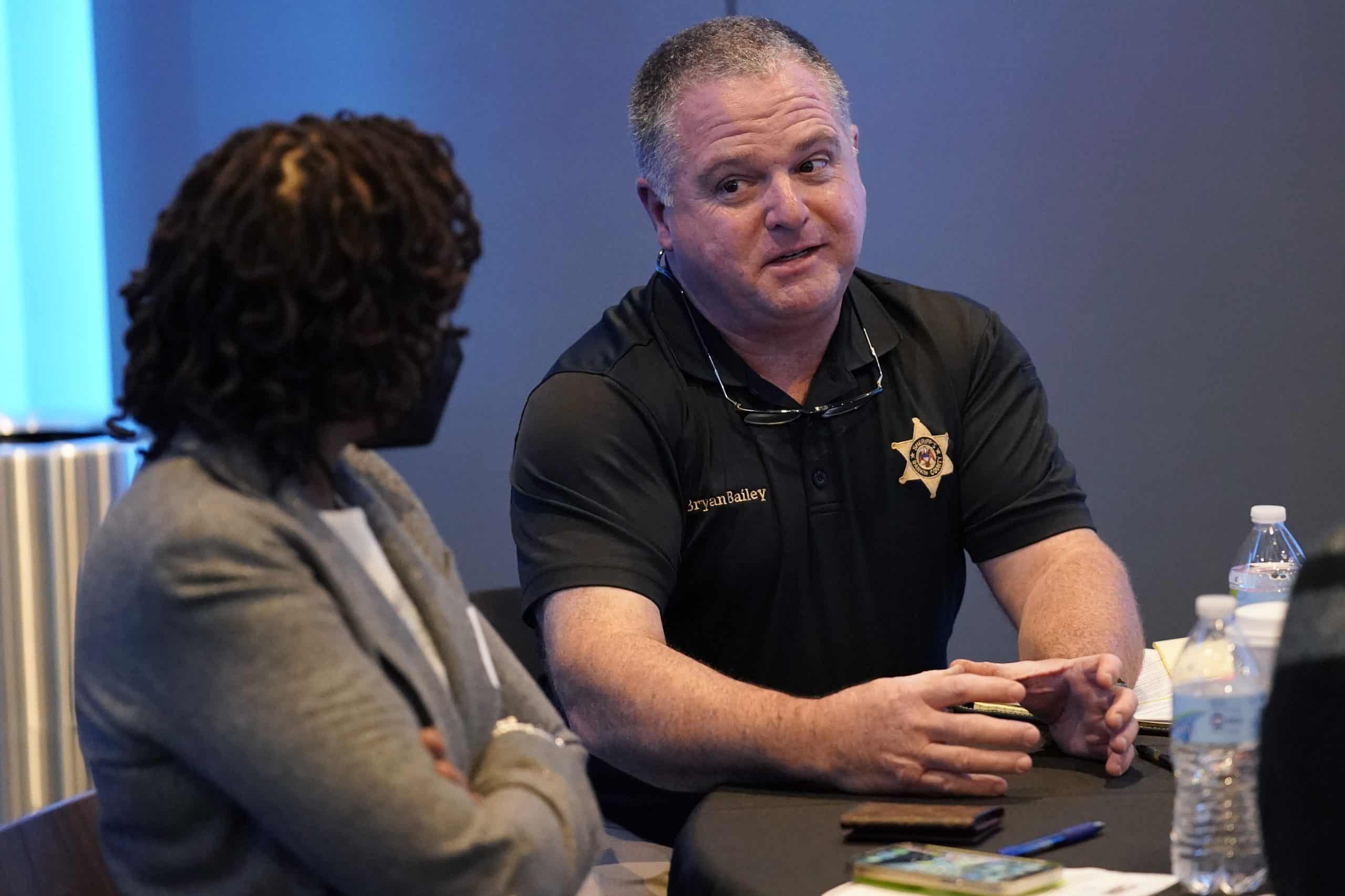Mississippi Today
The Sheriff, His Girlfriend and His Illegal Subpoenas

In 2014, Bryan Bailey, the sheriff of Rankin County, Miss., made what seemed like a series of routine requests of the local district attorney's office.
He needed grand jury subpoenas, he said, to force the phone company to turn over records of calls and text messages for what he called a “confidential internal investigation.”
Sheriff Bailey scrawled a brief note on a subpoena form and gave it to a paralegal in the district attorney's office. “Please keep this confidential between you and I,” the note read. “Possible wrongdoing by school district employee.”
But his requests had nothing to do with alleged wrongdoing, or any criminal investigation, according to a previously undisclosed report obtained by The New York Times and the Mississippi Center for Investigative Reporting at Mississippi Today. Instead, Sheriff Bailey tapped into the power of a grand jury at least eight times over a year to spy on his married girlfriend and the school employee with whom she was also “unfaithful,” the documents show.
The investigative report, compiled in 2016 by the district attorney at the time, Michael Guest, laid out evidence that Sheriff Bailey had duped the prosecutor's office and potentially violated state law on fraud, a felony that carries up to five years in prison.

Mr. Guest, now a U.S. congressman and chairman of the House Committee on Ethics, decided he could not pursue the case further because of conflicts of interest, including his years long friendship with the sheriff. He told two local judges what he had discovered and passed his investigation on to the state attorney general.
And that's where the matter ended.
According to interviews with former staff members in the attorney general's office, no one questioned the sheriff or conducted a full investigation. Jim Hood, the attorney general at the time, asked a senior attorney to look into the matter but did not pursue criminal charges.
Neither his office nor Mr. Guest informed the state agency that oversees law enforcement certifications, even though Mr. Guest was a voting member of the board. That agency could have reviewed the allegations and possibly revoked Sheriff Bailey's certification.
For seven years, every elected official who learned of the allegations kept them secret from the public, leaving citizens of Rankin County in the dark, even as they twice voted to re-elect Sheriff Bailey. He is on the verge of another re-election, having won the Republican primary in August and facing no opponent in November.
His conduct is the latest in a series of examples uncovered by The Times and Mississippi Today of how sheriffs in Mississippi can act with impunity, often using the power of their office to weaponize the criminal justice system for their own benefit with no risk of being held accountable, even when faced with serious allegations of abuse.
Sheriff Bailey and his department have been under national scrutiny and a federal civil rights investigation since five deputies and a local police officer pleaded guilty this year to torturing two Black men and shooting one of them in the mouth.
Sheriff Bailey did not respond to requests for comment. Nor did local officials aware of the allegations and the report, including then-Circuit Court Judges John H. Emfinger and William E. Chapman III. Mr. Guest declined to comment.

Mr. Hood said in a statement that he did not remember all the details of how the case was handled, but he insisted that his office had investigated and made the right call in not prosecuting.
He said he had passed Mr. Guest's report on to Ed Snyder, who was a special assistant attorney general working part time. Mr. Snyder recalled receiving the report but said he was asked to “take a look,” not to investigate. He said he only reviewed what criminal statutes might be used to prosecute.
Normally, a case involving possible public corruption would have been handled by the Public Integrity Division within the attorney general's office. Mr. Hood could not recall why he did not send the case there, but said he trusted Mr. Snyder's judgment.
Mr. Hood's best recollection, he said, is that he chose not to pursue charges because the sheriff had a plausible reason for investigating the people targeted by the subpoenas. He said he believed his former office's investigation had found that those people were involved in “some criminal activity, maybe drugs or a home burglary.”
But neither of the people whose phone calls and texts were subpoenaed were ever charged in a drug or burglary case, or any other criminal case. And there is no public evidence that indicates the subpoenas were part of a criminal inquiry.
If there had been a legitimate criminal case involving Sheriff Bailey's girlfriend, the sheriff should not have been involved in the case at all, said Matthew Steffey, a lawyer and a professor at the Mississippi College School of Law.
“There was an obvious and profound conflict of interest here,” he said. “If there was a legitimate criminal investigation, the sheriff should not have been subpoenaing his own girlfriend's phone records. And he certainly cannot do it without the knowledge or the direction of the district attorney's office.”
That the sheriff has not been prosecuted or otherwise held accountable, despite the evidence against him, reflects “an utter failure of our criminal justice system,” Professor Steffey added.
Mr. Guest began investigating Sheriff Bailey in the spring of 2016 after receiving a tip about his use of grand jury subpoenas.
He was initially “very doubtful” and began looking into the matter “in hopes to put these rumors quickly to rest,” he wrote in his investigative report.
But he soon discovered a series of phone record requests that appeared suspicious based on the numbers that Sheriff Bailey had targeted.
One of the numbers belonged to Kristi Pennington Shanks, an administrative assistant in the sheriff's office who had begun a relationship with Sheriff Bailey while she was married, according to the report. The other belonged to a local school district employee with whom Ms. Shanks also had been involved, the report states.
Mr. Guest wrote in his report that his office was not part of any investigation into the school employee or Ms. Shanks. Ms. Shanks, who remains the sheriff's girlfriend, did not respond to requests for comment.
According to copies of the subpoena requests included in Mr. Guest's report, the first request came from a Rankin County deputy who emailed the district attorney's office on Jan. 30, 2014. He asked a paralegal there, Kim Amason, to write up and stamp a subpoena for a list of the school employee's outgoing phone calls that month. Ms. Amason did not respond to a request for comment.
Throughout 2014, there were at least seven more subpoenas for texts and calls associated with the numbers of the former school employee and Ms. Shanks. Most of the requests directed phone companies to send records to Sheriff Bailey.
Grand juries, composed of up to two dozen people selected from the community, operate in secret. They investigate potential crimes, subpoena evidence, compel testimony and decide whether charges should be filed.
Practices vary by state, but typically the district attorney's office files paperwork for subpoenas on behalf of the grand jury, without a review by jurors or a judge. Law enforcement officers can request such subpoenas, serve them on the person or entity holding the records, and directly collect the evidence. Afterward, it is normal practice for officers to turn this evidence over to prosecutors, who maintain permanent investigative files on cases.
Under Mississippi law, grand jury subpoenas can be issued only to aid a legitimate criminal investigation. Violators can be prosecuted for fraud and face years in prison.
A decade ago, the state attorney general's office under Mr. Hood charged a former Meridian police officer with wire fraud after he forged signatures on a grand jury subpoena to get his wife's phone records when he suspected she had been unfaithful. He was convicted and spent a year in prison.
Experts said the statute of limitations had passed to bring any potential state charges that might have applied to Sheriff Bailey's actions. But details of the case could be getting a second look by federal authorities.
Fred Shanks, whose ex-wife became Sheriff Bailey's girlfriend and a target of his subpoenas, said he was recently interviewed by the F.B.I. Mr. Shanks is Mr. Guest's cousin and was the source of the original tip that prompted him to investigate.
In an interview with reporters, Mr. Shanks said he told authorities several times that both his and his girlfriend's phone's were being improperly tracked by Sheriff Bailey.
In 2015, after he got divorced, Mr. Shanks started dating Kristen Liberto, an investigator with the Rankin County Sheriff's Office.
Ms. Liberto said her professional relationship with the sheriff then soured. She found herself under review for leaving work to go to a chiropractor, and she discovered a tracking device attached to her car, she said. In October 2015, she said, Sheriff Bailey called her into his office and gave her two options: resign, or be arrested for filling out fraudulent timecards.
She resigned and felt “absolutely devastated,” she said.
The sheriff also demanded that Ms. Liberto return a piece of county equipment that was in her possession. “I want my tracker back,” she recalled him saying.
Then, in 2016, Mr. Shanks received a tip that Sheriff Bailey had previously obtained his and his ex-wife's phone records. He said he immediately called Mr. Guest. “There were multiple people who could have done something about this, but they did nothing,” said Mr. Shanks, who has represented Rankin County in the Mississippi Legislature since 2018. “It begs the question, how many other people did he do this to?”
Ilyssa Daly examines the power of sheriffs' offices in Mississippi as part of The Times's Local Investigations Fellowship. Jerry Mitchell, co-founder of the Mississippi Center for Investigative Reporting that's now part of Mississippi Today, is an investigative reporter who has examined civil rights-era cold murder cases in the state for more than 30 years.
This article first appeared on Mississippi Today and is republished here under a Creative Commons license.
Mississippi Today
On this day in 1896


MAY 18, 1896

The U.S. Supreme Court ruled 7-1 in Plessy v. Ferguson that racial segregation on railroads or similar public places was constitutional, forging the “separate but equal” doctrine that remained in place until 1954.
In his dissent that would foreshadow the ruling six decades later in Brown v. Board of Education, Justice John Marshall Harlan wrote that “separate but equal” rail cars were aimed at discriminating against Black Americans.
“In the view of the Constitution, in the eye of the law, there is in this country no superior, dominant, ruling class of citizens,” he wrote. “Our Constitution in color-blind and neither knows nor tolerates classes among citizens. In respect of civil rights, all citizens are equal before the law. The humblest is the peer of the most powerful. The law … takes no account of his surroundings or of his color when his civil rights as guaranteed by the supreme law of the land are involved.”
This article first appeared on Mississippi Today and is republished here under a Creative Commons license.
Did you miss our previous article…
https://www.biloxinewsevents.com/?p=359301
Mississippi Today
Renada Stovall, chemist and entrepreneur
Renada Stovall sat on the back deck of her rural Arkansas home one evening, contemplating life when she had a life-altering epiphany…
“I gotta get out of these woods.”
She heard it as clear as lips to her ear and as deep as the trees surrounding her property. Stovall's job as a chemist had taken her all over the country. In addition to Arkansas, there were stints in Atlanta, Dallas and Reno. But she was missing home, her parents and friends. She also knew, she needed something else to do.
“I thought, what kind of business can I start for myself,” said Stovall, as she watered herbs growing in a garden behind her south Jackson home. Some of those herbs are used in her all-natural products. “I know when I lived in Reno, Nevada, where it's very hot and very dry, there really weren't products available that worked for me, my hair, and my skin suffered. I've got a chemistry degree from Spelman College. I took the plunge and decided to create products for myself.”

In 2018, Stovall's venture led to the creation of shea butter moisturizers and natural soaps. But she didn't stop there, and in December 2022, she moved home to Mississippi and got to work, expanding her product line to include body balms and butters, and shampoos infused with avocado and palm, mango butter, coconut and olive oils.
Nadabutter, which incorporates Renada's name, came to fruition.

Stovall sells her balms and moisturizers at what she calls, “pop-up markets,” across the state during the summer. She's available via social media and also creates products depending on what of her ingredients a customer chooses. “My turmeric and honey is really popular,” Stovall added.
“The all-natural ingredients I use are great for conditioning the skin and hair. All of my products make you feel soft and luscious. The shea butter I use comes from West Africa. It's my way of networking and supporting other women. And it's my wish that other women can be inspired to be self-sufficient in starting their own businesses.”





This article first appeared on Mississippi Today and is republished here under a Creative Commons license.
Mississippi Today
On this day in 1954
MAY 17, 1954

In Brown v. Board of Education and Bolling v. Sharpe, the U.S. Supreme Court unanimously ruled that the “separate but equal” doctrine in Plessy v. Ferguson was unconstitutional under the 14th Amendment, which guaranteed equal treatment under the law.
The historic decision brought an end to federal tolerance of racial segregation, ruling in the case of student Linda Brown, who was denied admission to her local elementary school in Topeka, Kansas, because of the color of her skin.
In Mississippi, segregationist leaders called the day “Black Monday” and took up the charge of the just-created white Citizens' Council to preserve racial segregation at all costs.
This article first appeared on Mississippi Today and is republished here under a Creative Commons license.
-
SuperTalk FM6 days ago
Martin Lawrence making 3 stops in Mississippi on comedy tour
-
Our Mississippi Home4 days ago
Beat the Heat with Mississippi’s Best Waterparks
-
SuperTalk FM1 day ago
State auditor cracking down on Mississippians receiving unemployment benefits
-
Our Mississippi Home5 days ago
Charlie’s U-Pik: Opening Soon for the Summer Season
-
Mississippi News Video4 days ago
Jackson has a gang problem
-
Kaiser Health News4 days ago
Medicaid ‘Unwinding’ Decried as Biased Against Disabled People
-
Local News22 hours ago
Family files lawsuit after teen’s suicide in Harrison County Jail
-
228Sports4 days ago
George County Pours Runs In 6A South State Title Victory At PRC











































